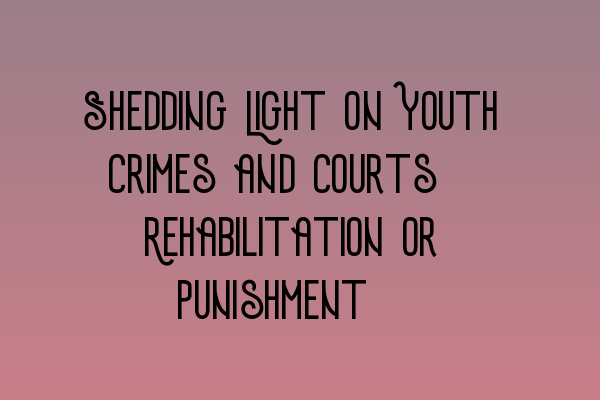Shedding Light on Youth Crimes and Courts: Rehabilitation or Punishment?
When it comes to dealing with youth crimes, there has always been a debate surrounding the most effective approach: rehabilitation or punishment? The youth justice system plays a crucial role in shaping the future of young offenders, and striking the right balance between rehabilitation and punishment is essential.
At SQE Criminal Law & Practice Law UK, we believe in exploring this topic in depth to provide a comprehensive understanding of the complexities involved. By shedding light on the pros and cons of both rehabilitation and punishment, we aim to facilitate an informed discussion on the best way forward.
Understanding Youth Crimes
Youth crimes are offenses committed by individuals under the age of 18. Common examples include theft, drug possession, assault, and vandalism. It’s essential to recognize that young offenders often come from diverse backgrounds and face various challenges that contribute to their involvement in criminal activities.
By exploring the root causes of youth crimes, we can identify underlying factors such as poverty, lack of education, peer pressure, and family dysfunction. It’s crucial to address these underlying issues to break the cycle of offending and ensure a brighter future for young individuals.
Rehabilitation: A Second Chance
Rehabilitation focuses on providing young offenders with the necessary support and guidance to reintegrate into society as law-abiding citizens. It aims to address the underlying causes of criminal behavior through educational programs, counseling, and skill development.
One key advantage of rehabilitation is that it promotes personal growth and positive behavioral change. By addressing the root causes of offending, rehabilitation enables young individuals to develop critical life skills, improve their education, and gain employability. This approach emphasizes the potential for change and provides a second chance for young offenders to turn their lives around.
Research has shown that rehabilitation programs, such as vocational training and therapy, can significantly reduce reoffending rates among young offenders. By equipping them with the necessary tools and opportunities, we can break the cycle of crime and create a safer society.
Punishment: Deterrence and Accountability
Punishment, on the other hand, focuses on holding young offenders accountable for their actions. The aim is to deter future offenses by imposing penalties such as community service, probation, or custodial sentences. The conviction is that the fear of punishment will deter young individuals from engaging in criminal activities.
Advocates of punishment argue that it sends a strong message to potential offenders and protects society by removing dangerous individuals from the community. They believe that holding young offenders accountable for their actions through punishment promotes law and order.
However, critics of punishment emphasize that it may not address the root causes of offending and can potentially exacerbate the problem. Imprisonment, for example, may expose young individuals to further criminal influences, hindering their chances of rehabilitation.
Finding a Balanced Approach
While the debate between rehabilitation and punishment continues, it is essential to recognize the value of finding a balanced approach that combines elements of both. By incorporating rehabilitation programs within the youth justice system, we can hold young offenders accountable while providing them with the necessary tools for personal growth and change.
Demystifying the Solicitors Qualifying Examination Format
LLC Formation Made Simple: Step-by-Step Guide for UK Entrepreneurs
Business Regulations in the UK: A Comprehensive Overview
Preparing for the SQE Exam: Strategies and Resources for Success
SQE Workshops and Webinars: Accelerate Your Exam Preparation
In conclusion, the issue of youth crimes and the appropriate judicial response is a complex one. By considering the benefits and drawbacks of rehabilitation and punishment, we can work towards a youth justice system that simultaneously holds young offenders accountable and provides a path for rehabilitation and reintegration. It is crucial to invest in the various support systems and programs aimed at addressing the root causes of youth crimes, as this will ultimately pave the way for a brighter future for both the young offenders and society as a whole.
For more information on criminal law, kindly refer to our related articles:
- Demystifying the Solicitors Qualifying Examination Format
- LLC Formation Made Simple: Step-by-Step Guide for UK Entrepreneurs
- Business Regulations in the UK: A Comprehensive Overview
- Preparing for the SQE Exam: Strategies and Resources for Success
- SQE Workshops and Webinars: Accelerate Your Exam Preparation
